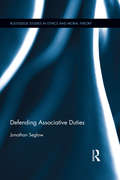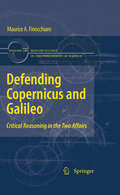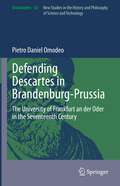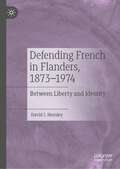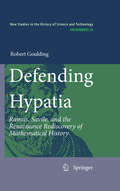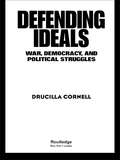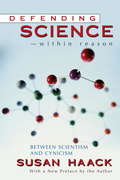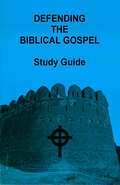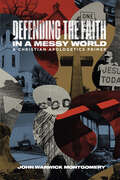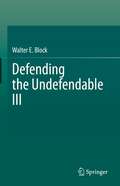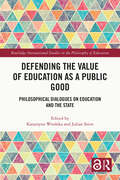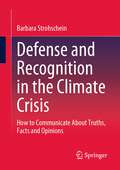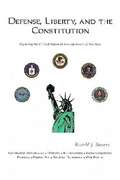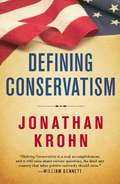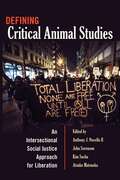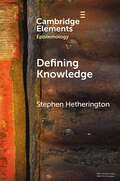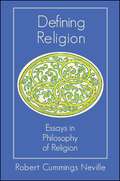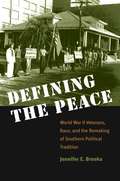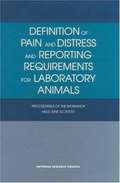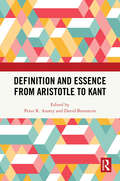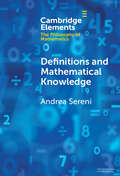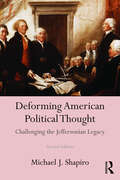- Table View
- List View
Defending Associative Duties (Routledge Studies in Ethics and Moral Theory #24)
by Jonathan SeglowThis book explores the associative duties we owe to our children, parents, friends, colleagues, associates and compatriots and defends a novel account which justifies such duties through the realization of values that are produced in these various kinds of social relationships. Seglow engages with several key contemporary debates including parental rights over children’s education, the burdens of eldercare, permissible partiality to friends, and global justice versus compatriot duties.
Defending Copernicus and Galileo
by Maurice A. FinocchiaroAlthough recent works on Galileo's trial have reached new heights of erudition, documentation, and sophistication, they often exhibit inflated complexities, neglect 400 years of historiography, or make little effort to learn from Galileo. This book strives to avoid such lacunae by judiciously comparing and contrasting the two Galileo affairs, that is, the original controversy over the earth's motion ending with his condemnation by the Inquisition in 1633, and the subsequent controversy over the rightness of that condemnation continuing to our day. The book argues that the Copernican Revolution required that the hypothesis of the earth's motion be not only constructively supported with new reasons and evidence, but also critically defended from numerous old and new objections. This defense in turn required not only the destructive refutation, but also the appreciative understanding of those objections in all their strength. A major Galilean accomplishment was to elaborate such a reasoned, critical, and fair-minded defense of Copernicanism. Galileo's trial can be interpreted as a series of ecclesiastic attempts to stop him from so defending Copernicus. And an essential thread of the subsequent controversy has been the emergence of many arguments claiming that his condemnation was right, as well as defenses of Galileo from such criticisms. The book's particular yet overarching thesis is that today the proper defense of Galileo can and should have the reasoned, critical, and fair-minded character which his own defense of Copernicus had.
Defending Descartes in Brandenburg-Prussia: The University of Frankfurt an der Oder in the Seventeenth Century (Archimedes #62)
by Pietro Daniel OmodeoThis volume is a study of the many dimensions of the early reception of Cartesianism in German-speaking Europe during the seventeenth century based on the case of the University of Frankfurt an der Oder. It investigates the broad context of that discussion, which was at once scientific, cultural, political and socio-institutional. Chapter by chapter, the book sheds light on the most relevant aspects of the environment of the time. It is aimed at historians of science and philosophy, as well as scholars investigating German-speaking Europe of the 17th century.
Defending French in Flanders, 1873–1974: Between Liberty and Identity
by David J. HensleyThis book examines the efforts of the French-speaking minority in Flanders, Belgium, to maintain a legal and social presence of the French language in Flemish public life. Chronologically, the study is bookended by two developments, almost exactly a century apart. In 1873, the first laws were passed which required the use of Dutch in some aspects of public administration in Flanders, challenging the de facto use of French among the Flemish ruling class. One hundred and one years later, the last French daily newspaper in Flanders collapsed, marking the end of a once-vibrant French-language public sphere in Flanders. The author contends that the methods and arguments by which French speakers defended the role of French in Flemish public life changed along with the social and political situation of this minority. As the Flemish movement grew over the course of the twentieth century, French speakers’ appeals to the “free choice” of language lost traction, and they put forward claims that they represented an ethnolinguistic minority who deserved protection for their mother tongue. Providing new insights for scholars of European history, and in conversation with the literature on liberalism, national identity, and Francophonie, this book demonstrates how the debate over the role of French in Flanders was at the center of Belgium’s ethnolinguistic conflict – the repercussions of which continue to be felt to this day.
Defending Hypatia
by Robert GouldingWhy should mathematics, the purest of sciences, have a history? Medieval mathematicians took little interest in the history of their discipline. Yet in the Renaissance the history of mathematics flourished. This book explores how Renaissance scholars recovered and reconstructed the origins of mathematics by tracing its invention in prehistoric Antiquity, its development by the Greeks, and its transmission to modern Europe via the works of Euclid, Theon and Proclus. The principal architects of this story -- the French philosopher and University of Paris reformer Peter Ramus, and his critic, the young Oxford astronomy lecturer Henry Savile - worked out diametrically opposed models for the development of the mathematical arts, models of historical progress and decline which mirrored each scholar's larger convictions about the nature of mathematical thinking, the purpose of the modern university, and the potential of the human mind. In their hands, the obscure story of mathematical history became a site of contention over some of the most pressing philosophical and pedagogical debates of the sixteenth century.
Defending Ideals: War, Democracy, and Political Struggles
by Drucilla CornellIn this book, Drucilla Cornell examines the crisis on the left and asks how we can turn back toward more left-wing ideals. She looks at the meaning of freedom through various lenses as well as the dissolution of feminism. She discusses and critiques such major thinkers as: Amartya Sen, Adorno, Martha Nussbaum, John Rawls, Richard Falk, and Paul Berman among others.
Defending Rorty
by William M. CurtisLiberal democracy needs a clear-eyed, robust defense to deal with the increasingly complex challenges it faces in the twenty-first century. Unfortunately much of contemporary liberal theory has rejected this endeavor for fear of appearing culturally hegemonic. Instead, liberal theorists have sought to gut liberalism of its ethical substance in order to render it more tolerant of non-liberal ways of life. This theoretical effort is misguided, however, because successful liberal democracy is an ethically demanding political regime that requires its citizenry to display certain virtues and habits of mind. Against the grain of contemporary theory, philosopher Richard Rorty blends American pragmatism and romanticism to produce a comprehensive vision of liberal modernity that features a virtue-based conception of liberal democracy. In doing so, Rorty defends his pragmatic liberalism against a host of notable interlocutors, including Charles Taylor, Nancy Fraser, Hilary Putnam, Richard J. Bernstein, and Jean Bethke Elshtain.
Defending Science - within Reason
by Susan HaackSweeping in scope, penetrating in analysis, and generously illustrated with examples from the history of science, this new and original approach to familiar questions about scientific evidence and method tackles vital questions about science and its place in society. Avoiding the twin pitfalls of scientism and cynicism, noted philosopher Susan Haack argues that, fallible and flawed as they are, the natural sciences have been among the most successful of human enterprises-valuable not only for the vast, interlocking body of knowledge they have discovered, and not only for the technological advances that have improved our lives, but as a manifestation of the human talent for inquiry at its imperfect but sometimes remarkable best.This wide-ranging, trenchant, and illuminating book explores the complexities of scientific evidence, and the multifarious ways in which the sciences have refined and amplified the methods of everyday empirical inquiry; articulates the ways in which the social sciences are like the natural sciences, and the ways in which they are different; disentangles the confusions of radical rhetoricians and cynical sociologists of science; exposes the evasions of apologists for religious resistance to scientific advances; weighs the benefits and the dangers of technology; tracks the efforts of the legal system to make the best use of scientific testimony; and tackles predictions of the eventual culmination, or annihilation, of the scientific enterprise.Writing with verve and wry humor, in a witty, direct, and accessible style, Haack takes readers beyond the "Science Wars" to a balanced understanding of the value, and the limitations, of the scientific enterprise.
Defending the Biblical Gospel
by John Warwick MontgomeryThis series is designed to help the lay Christian confidently proclaim and defend the faith. Too many Christians know"what" they believe, but not necessarily"why" they believe it. The information in this series will help the listener to"...always be ready to make a defense to every one who asks you to give an account for the hope that is in you." (I Peter 3:15)
Defending the Correspondence Theory of Truth
by Joshua RasmussenThe correspondence theory of truth is a precise and innovative account of how the truth of a proposition depends upon that proposition's connection to a piece of reality. Joshua Rasmussen refines and defends the correspondence theory of truth, proposing new accounts of facts, propositions, and the correspondence between them. With these theories in hand, he then offers original solutions to the toughest objections facing correspondence theorists. Addressing the Problem of Funny Facts, Liar Paradoxes, and traditional epistemological questions concerning how our minds can access reality, he challenges recent objections, and defends what has traditionally been the most popular theory of truth. Written with clarity, precision, and sensitivity to a range of philosophical backgrounds, his book will appeal to advanced students and scholars seeking a deeper understanding of the relationship between truth and reality.
Defending the Faith in a Messy World: A Christian Apologetics Primer
by John Warwick MontgomeryMuch to the dismay of its critics, defending the Christian faith does not rest on a complicated, philosophical quest nor illogical assumptions. The task of defending the Christian faith – or Christian apologetics – is for every Believer. In this easy-to-read, beginners guide to Christian apologetics, scholar and apologist Dr. John Warwick Montgomery lays the groundwork for why the case for Christianity is factually and historically compelling as well as how we should defend the faith.The book's three sections will lead you through the importance of Christian apologetics, issues the nonbeliever may raise, and how to bring the centrality of the faith – Christ on the cross – before atheists, skeptics and people from other worldviews.For those who want a lighthearted yet thorough introduction to the how, why and what of Christian apologetics, this primer is a go-to guide for those who hope to "be ready always to give an answer for the faith that is within" (1 Peter 3:15).
Defending the Undefendable III
by Walter E. BlockThis book probes the depths of libertarian philosophy and highlights the need for laws that protect all individuals in society. This book defines libertarianism as a theory of what is just law, it is predicated upon the non-aggression principle (NAP). This legal foundation of the libertarian philosophy states that it should be illicit to threaten or engage in initiatory violence against innocent people. Ultimately, this book presents the notion, defend the “undefendable.” This book defines that as; any person, institution, professional, worker, which is either reviled by virtually everyone, or prohibited by law, and does not violate the NAP. Weaved throughout, this book uses political philosophy to present three fundamental premises to explain this libertarian point of view. Firstly, this book defines the non-aggression principle (NAP). Secondly, demonstrates the importance and relevance of private property rights in this context. This book uses practical examples to demonstrate the theoretical application of freedom rights using libertarianism principles.
Defending the Value of Education as a Public Good: Philosophical Dialogues on Education and the State (Routledge International Studies in the Philosophy of Education)
by Julian Stern Katarzyna WrońskaCentred around a philosophical argument for contemporary education as a fundamental good, this edited volume demonstrates the benefits that education brings in a civil and flourishing societal context while also critiquing the state’s role in supporting and strengthening this educational focus.Chapters present in-depth philosophical and historical arguments that explore core aspects of education that are frequently overlooked, illustrating education’s role as a non-partisan public good during contentious times. Through this volume, diverse voices are heard from those with experience of life under communism as well as life in a stable democracy arguing, for example, that despite differing contexts, the value of education is autonomous and intrinsic. Ultimately drawing on conceptual frameworks, this timely volume reconciles the Anglo-American Continental dialogues on education and presents novel and challenging ideas to its readers.Striving to inspire new research through its various reflections on the relationship between education and the state, the book will be useful to scholars, researchers, and academics in the fields of philosophy of education, education policy, sociology of education as well as theory of education.The Introduction as well as Chapters 3, 5, 6 and 7 of this book are freely available as a downloadable Open Access PDF at http://www.taylorfrancis.com under a Creative Commons Attribution-ShareAlike (CC-BY-SA) 4.0 license.Chapter 9 of this book is freely available as a downloadable Open Access PDF at http://www.taylorfrancis.com under a Creative Commons Attribution-Non Commercial-No Derivatives (CC-BY-NC-ND) 4.0 license.
Defense and Recognition in the Climate Crisis: How to Communicate About Truths, Facts and Opinions
by Barbara StrohscheinTruths, facts and opinions on the climate issue are often met with psychological or social defense, both publicly and privately. Based on selected psychological and philosophical theories as well as data material, this book shows how defense comes about, how it works, and how, on the other hand, the necessary recognition can succeed on various levels. It is only through recognition that constructive discourse becomes possible. This book offers all the basics to be able to theoretically and practically solve communication conflicts between defense and recognition in the climate crisis.
Defense, Liberty, and the U.S. Constitution: Exploring the Critical National Security Issues of Our Time
by Ron SievertEach chapter in this work was written with an intent to identify in advance and thoroughly discuss many of the important legal issues that are likely to emerge as a result of today's national security threats. It is the author's hope that this work will encourage solutions before it is too late to proceed with deliberation and logic, such as has been the case in too many previous incidents.
Defining Conservatism
by Jonathan KrohnDefining Conservatismis a passionate appeal to a political movement that is re-examining its identity as Republicans set their sights on 2010 and beyond. A dedicated young conservative, Jonathan Krohn presents conservative philoso¬phy’s basic tenets in this remarkably earnest and impeccably reasoned primer. This book, clear and informative, is a history lesson, a manifesto, and a roadmap for the future. It is Krohn’s rallying call to action not just for conservatives, but for anyone interested in the political state of our nation. InDefining Conservatism, Krohn challenges “government expansionists,” whose faith in Wash¬ington and the basic pillars of government exceeds their faith in the individual. At the same time, he boldly stakes out four unshakeable principles for conservatives to rally around: ? Respect for the Constitution ? Respect for human life ? Belief in minimalist government ? Insistence upon personal responsibility Anyone interested in the basic differences between conservative and liberal thought will find Krohn’s writing at once compelling, informa¬tive, intelligent, and—for those who do not agree with him—in some respects controversial. Defining Conservatismis a must-read for anyone who is interested in the basic principles upon which the United States was founded, and perhaps most importantly, for anyone who is concerned with the future of this country.
Defining Conservatism
by Jonathan KrohnA dedicated young Conservative, Jonathan Krohn presents Conservative philosophy's basic tenets in this remarkably earnest and impeccably reasoned primer. This book, clear and informative, is a history lesson, a manifesto, and a roadmap for the future.Anyone interested in the basic differences between Conservative and Liberal thought will find Krohn's writing at once compelling, informative, intelligent, and--for those who do not agree with him--in some respects controversial.
Defining Critical Animal Studies: An Intersectional Social Justice Approach for Liberation
by Anthony J. Nocella II John Sorenson Atsuko Matsuoka Kim SochaThis is the first book to define the philosophical and practical parameters of critical animal studies (CAS). Rooted in anarchist perspectives that oppose all systems of domination and authoritarianism, CAS both challenges anthropocentrism and presents animal liberation as a social justice movement that intersects with other movements for positive change. Written by a collection of internationally respected scholar-activists, each chapter expands upon the theory and practice underlying the total liberation approach, the roles of academics and activists, and the ten principles of CAS. With apolitical animal studies and exploitative animal research dominating higher education, this book offers a timely counter-narrative that demands the liberation of all oppressed beings and the environment. Defining Critical Animal Studies will interest educators, students, activists, community members, and policy makers seeking accessible theory that can be put into action.
Defining Knowledge: Method and Metaphysics (Elements in Epistemology)
by Stephen HetheringtonPost-Gettier epistemology is increasingly modalized epistemology – proposing and debating modally explicable conditionals with suitably epistemic content (an approach initially inspired by Robert Nozick's 1981 account of knowledge), as needing to be added to 'true belief' in order to define or understand knowing's nature. This Element asks whether such modalized attempts – construed as responding to what the author calls Knowing's Further Features question (bequeathed to us by the Meno and the Theaetetus) – can succeed. The answer is that they cannot. Plato's and Aristotle's views on definition reinforce that result. Still, in appreciating this, we might gain insight into knowing's essence. We might find that knowledge is, essentially, nothing more than true belief.
Defining Religion: Essays in Philosophy of Religion
by Robert Cummings NevilleIn this collection of essays, written over the past decade, Robert Cummings Neville addresses contemporary debates about the concept of religion and the importance of the comparative method in theology, while advancing and defending his own original definition of religion. Neville's hypothesis is that religion is a cognitive, existential, and practical engagement of ultimate realities—five ultimate conditions of existence that need to be engaged by human beings. The essays, which range from formal articles to invited lectures, develop this hypothesis and explore its ramifications in religious experience, philosophical theology, religious studies, and the works of important thinkers in philosophy of religion. Defining Religion is an excellent introduction to Neville's work, especially to the systematic philosophical theology presented in his magisterial three-volume set Philosophical Theology.
Defining the Peace
by Jennifer E. BrooksIn the aftermath of World War II, Georgia's veterans--black, white, liberal, reactionary, pro-union, and anti-union--all found that service in the war enhanced their sense of male, political, and racial identity, but often in contradictory ways. In Defining the Peace, Jennifer E. Brooks shows how veterans competed in a protracted and sometimes violent struggle to determine the complex character of Georgia's postwar future. Brooks finds that veterans shaped the key events of the era, including the gubernatorial campaigns of both Eugene Talmadge and Herman Talmadge, the defeat of entrenched political machines in Augusta and Savannah, the terrorism perpetrated against black citizens, the CIO's drive to organize the textile South, and the controversies that dominated the 1947 Georgia General Assembly. Progressive black and white veterans forged new grassroots networks to mobilize voters against racial and economic conservatives who opposed their vision of a democratic South. Most white veterans, however, opted to support candidates who favored a conservative program of modernization that aimed to alter the state's economic landscape while sustaining its anti-union and racial traditions. As Brooks demonstrates, World War II veterans played a pivotal role in shaping the war's political impact on the South, generating a politics of race, anti-unionism, and modernization that stood as the war's most lasting political legacy.
Definition Of Pain And Distress And Reporting Requirements For Laboratory Animals: Proceedings Of The Workshop Held June 22, 2000
by Committee on Regulatory Issues in Animal Care UseA report on the Definition Of Pain And Distress And Reporting Requirements For Laboratory Animals
Definition and Essence from Aristotle to Kant
by David Bronstein Peter R. AnsteyThis volume brings together 12 essays exploring the history of theories of definition and essence in Western philosophy from Aristotle to Kant. Definition and essence have been central to philosophical theorising since antiquity and remain so to this day. This volume presents a series of explorations of key authors and themes connected by a common set of questions: What are definitions and essences? What are the connections between them? What are their logical and metaphysical properties? What sorts of things have definitions and essences and what sorts of things do not? What functions do definitions and essences serve in the physical, mathematical, and human sciences? How, if at all, can we come to know them? This volume shows that answering these questions allows us to see in a new light key figures and movements in the history of Western thought. The volume’s broad historical sweep also facilitates comparisons between different figures. And it reveals important connections between different subfields of philosophy as these were developed over the centuries – logic, metaphysics, epistemology, philosophy of language, and natural philosophy among them.Definition and Essence from Aristotle to Kant will be of interest to scholars and graduate students working in the history of philosophy, history of logic, history of mathematics, epistemology, and metaphysics.
Definitions and Mathematical Knowledge (Elements in the Philosophy of Mathematics)
by Andrea SereniThis Element discusses the philosophical roles of definitions in the attainment of mathematical knowledge. It first focuses on the role of definitions in foundational programs, and then examines their major varieties, both as regards their origins, their potential epistemic roles, and their formal constraints. It examines explicit definitions, implicit definitions, and implicit definitions of primitive terms, these latter being further divided into axiomatic and abstractive. After discussing elucidations and explications, various ways in which definitions can yield mathematical knowledge are surveyed.
Deforming American Political Thought: Challenging the Jeffersonian Legacy
by Michael J. ShapiroDeforming American Political Thought offers an alternative to the dominant American historical imagination, treating issues that range from the nature of Thomas Jefferson's vision of an egalitarian nation to the persistence of racial inequality. Presenting multifaceted arguments that transcend the myopic scope of traditional political discourses, Michael J. Shapiro summons disparate disciplines and genres – architecture, crime stories, novels, films, and jazz/blues music (among others) to provide approaches to the comprehension of diverse facets of American political thought from the founding to the present. The book’s various investigations disclose that there have always been dissenting voices, articulated in diverse genres of expression that cast doubt on the moral purpose and exceptionalism of the American mind. This highly anticipated updated second edition features a preface focusing on aesthetic theory and the contributions of artistic genres for political analysis, and a completely new chapter on critical thinking about the US western and urban encounters afforded by the two HBO series, Deadwood and The Wire respectively.
